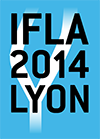
80th IFLA General Conference and Assembly
16-22 八月 2014, Lyon, France
Call for Papers
Library Theory and Research Section
Theme:
Libraries in the political process: benefits and risks of political visibility
Aim and Scope of the Session
The theme "Libraries in the political process: Benefits and risks of political visibility" reflects the global theme of the IFLA 2014 Congress, "Libraries, Citizens, Societies: Confluence for Knowledge", in many respects. Librarians often complain that libraries are overlooked or taken for granted. But when libraries appear in the headlines, it may be a mixed blessing.
This LTR program will focus on the contemporary roles of libraries and librarians in turbulent political environments: including cases where libraries are damaged or burned in violent protests, and at the other extreme, cases where the public mobilizes in response to the closing of a library. In these times of financial crisis, identity crisis, democracy crisis, managerial crisis…these questions challenge us to rethink our roles in relation to the public we serve. Our Session will look in a scholarly way at these phenomena, not limiting the session to descriptions of the incidents or the defense of libraries, but at the profession's responses and at what it says about the way the profession is conceptualising its role in society. Papers exploring research on political roles of libraries will be invited. Indeed, this question includes sociological, professional, educational, philosophical and historical issues, all of which have the potential to contribute to the confluence for knowledge.
Papers may cover some of the following topics:
Sociological issues:
What do we understand about why communities (or groups within communities) should burn down their libraries or, in contrary cases, mobilize to defend the libraries?
Educational issues:
There is an assumption that creating links between schools and libraries is a good thing as this promotes acculturation and exposure to culture, books and libraries, and creates a positive image of libraries. But perhaps such a link creates undesirable confusion between schools and libraries. Schools are associated with learning, discipline and evaluation. Libraries should evoke different associations, providing space for leisure and non-conformity.
Organizational and professional issues:
Is advocacy the answer to problems relating to the image or perception of libraries in communities? Is the managerialist discourse of library promotion, strategic planning, and quantitative evaluation of library services really working as an answer to difficulties of this kind?
What are the reactions of librarians and what does it reflect of our profession?
How do we represent ourselves in our role of providing public services?
Political issues:
How does this turbulence experienced in libraries raise questions about what democracy is and how libraries are part of it? Is participatory democracy a good answer for this crisis of representation?
It is anticipated that presentations be 20 minutes with time for questions at the end of the session.
Important dates
| Saturday, 15 February 2014 | Deadline for submission of abstract |
| Saturday, 15 March 2014 | Notification of acceptance/rejection |
| Saturday, 31 May 2014 | Deadline for submission of text |
Submission Guidelines
The proposals must be submitted in an electronic format and must contain:
- Title of paper
- Summary of paper (250 - 350 words maximum)
- Speaker's name, address, telephone and fax numbers, professional affiliation, email address and biographical note (40 words)
The proposal can be submitted by email in English or French.
The final paper should preferably be presented as a paper (that may be published on the IFLA website and as an option in the IFLA Journal). If the final presentation will be in the format of a power point, a substantial abstract will be required, including references such as URLs and bibliographies.
Submissions should be sent by email to:
section.IFLA.LTR@gmail.com before Saturday February 15th 2014
Raphaëlle Bats, Information Coordinator, IFLA Library Theory and Research Section
Peter Lor, IFLA Library Theory and Research Section SC Member
Milan Vasiljevic, IFLA Library Theory and Research Section SC Member.
Submissions
All proposals must be in before 15 二月 2014.
Please note
All expenses, including registration for the conference, travel, accommodation etc., are the responsibility of the authors/presenters. No financial support can be provided by IFLA, but a special invitation can be issued to authors.
Congress Attendance Grants
The French National Committee and IFLA have worked hard to secure funds for Conference Participation Grants. Up-to-date information will be available on our Conference Participation Grants webpage.
Last update: 5 January 2014


